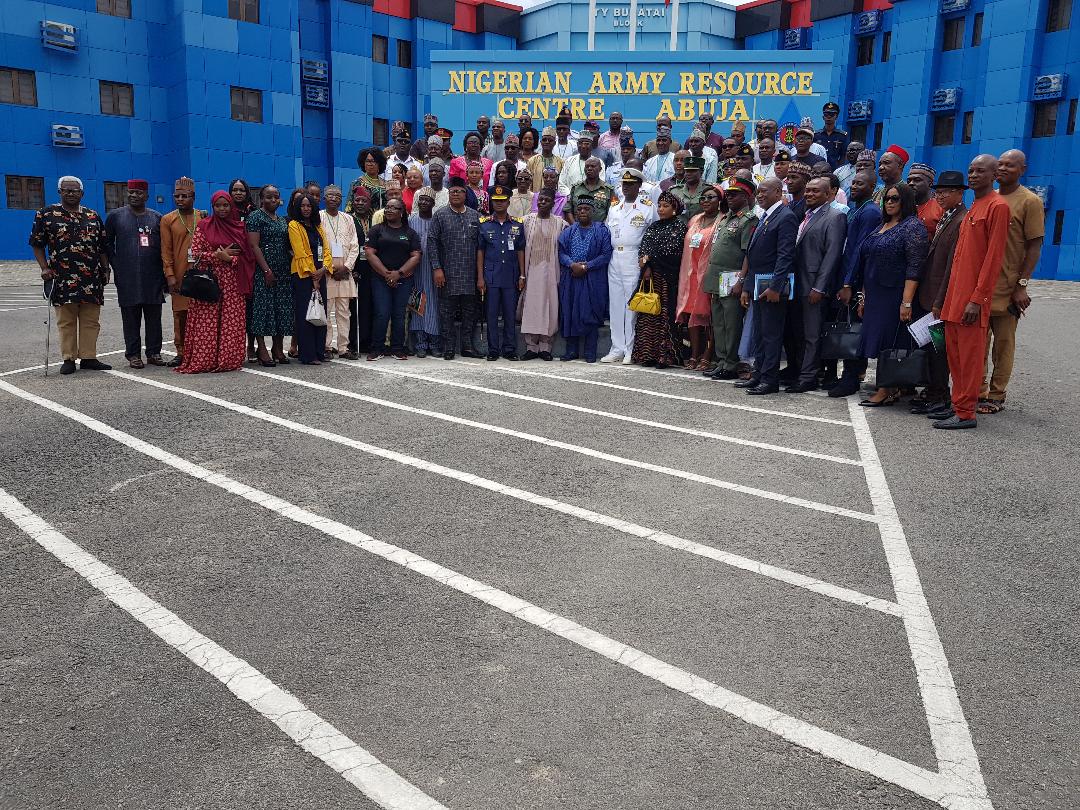Article: Exploring possible ways of using broadcast media to support the military manage conflicts in Nigeria
By David Amusa
In all these cases in the different parts of Nigeria, the Nigerian state has employed kinetic and non-kinetic solutions in containing these conflicts. In spite of these actions by the military and other law enforcement agencies, these conflicts have persisted.
A cursory examination and gap in the mitigation of the conflicts have been the lack of robust role of the media, particularly the broadcast media.
It is recognized world over that communication has a function of addressing conflicts and crises more in particular broadcasting with its power of voice and animation.
The broadcast media can be of help in managing and mitigating these conflicts that threaten the existence of the country. However, in many of these clashes, the broadcast media have been found to under report the situations. In some situations, it has not engage in robust advocacy to mitigate the conflict. In other cases, the broadcast media have shown obvious bias against the Nigerian state in its efforts to contain the situation. In some instances they report about the clashes, they have not shown much commitment as some of the reports are not embedded.
To mitigate these conflicts, the way and manner broadcast managers create and programme their contents can go a long way in managing them. Hence, the need for broadcast media houses to be conscious of their roles and employ concerted efforts with the military and other law enforcement agents in the war against insurgency. This will require the re-direction and re-orientation of broadcast professionals in helping to contain these conflicts.
It is against this backdrop that a two- day workshop was organized by Zakclair Investments Limited and the Defence Headquarters to train senior content creators in broadcast stations across the country, on Thursday 27 and Friday 28, April, 2023, at the Nigerian Army Resource centre, Asokoro, Abuja.
Speakers and other resource persons were drawn from the military, the broadcast industry and the academia.
A total of nine papers were presented by 9 resource persons.
They include: “Dimensioning Conflicts, Types, Actors, Rules of Engagement And Humanitarian Concerns”, “Winning Hearts and Minds As Tools in Conflict Mitigation and Management”,”Broadcasting, State Fragility and Sustainable Content in Peace Building,” and “Talkshows As Platforms for Conflict Mitigation and Management”,
Other papers were; “Anchor/Host Obligations in Conflict-Sensitive Broadcast Content”, “Ownership,a Markets and Broadcast Content Generation In Times of Conflict”, “Peace Journalism Paradigms in Internal Conflict Management”,”Intensification and Implication of Fake News and Hate Speech In Nigeria”, and “Lessons From Nigeria Stability and Reconciliation Programme(NSRP) Initiated By The UK DFID”.
The workshop was chaired by Mallam Balarabe Shehu Ilelah, the Director-General of Nigerian Broadcasting Commission(NBC) and the Chief host was the Chief of Defence Staff, Gen. LEO Irabor CFR, who was ably represented by Rear Admiral PY Pani, the Director of Training, DHQ,while the Chief Executive Officer of Zakclair Investments Limited , Adebayo Adelabu-Abdulrazak was the host. Also, the Chief of Army Staff, Lt. Gen Farouk Yahaya had Maj Gen Etsu Ndagi,as his representative while the Chief of Air Staff, Air Marshal Isiaka Amao was represented by AVM UK Abdullahi.
In declaring the workshop open, the Chief of Defence Staff, Gen. Irabor, charged the participants to build a synergy between the Armed Forces of Nigeria and the media in curtailing the various security challenges Nigeria is witnessing by coming up with a road map that would align the Armed Forces operational activities with the objectives of the workshop.
He said that the idea of the workshop came in a bid to minimize collateral damage and civilian casualties in military operations through the instrumentality of broadcast content dissemination.
The chairman, Mallam Ilelah in his remarks appealed to the media to exhibit professionalism and avoid creating tension or confusion in the minds of the citizens when reporting security matters because of its implication on the nation’s corporate existence.
He extolled the potentials of the broadcast media and called on participants to ensure that broadcast contents were in conformity with national, public and defence interest.
Earlier, Mr. Adebayo Adelabu-Abdulrazak, said the workshop was organized for content creators and programmers in broadcast stations to explore possible ways the broadcast media could be used in supporting the military in this critical period of the nation’s life.
He implored the participants to take advantage of the workshop to move the country, the broadcast industry and the military forward in their endeavours.
The highlight of the workshop was a breakout session into four(4) groups. The first group was charged with examining the primacy of national interest in broadcast content and dissemination while the second group looked at optimizing civil-military relations. The third group focused on issues in broadcast content generation and sustainability and the fourth group discussed balancing editorial programmes and marketing imperatives.

In a communique issued at the end of the Workshop, the participants observed that in as much as conflicts exist in Nigerian society, that the military should at all times stick to their rules of engagement and bring to order among them those who break the rules. In addition, both the military and the media should understand each other and acknowledge their differences in operations to ensure mutual respect necessary in optimizing military-media relations.
They noted that the emphasis should not be on kinetic efforts alone but non- kenetic efforts such as humanitarian concern.
Furthermore, they agreed that in as much as Nigeria is fragile and prone to crises, there is the need for broadcast contents to be geared towards peace building to stem these developments.
They recognised the importance of the audience particularly the youthful audience who are becoming restive and advised that content creators in the broadcast industry should exploit talkshows,musicals, drama etc, to stem their restiveness.
The participants noted with dismay the activities of some anchors/host of programmes who stoke fire from conflicts through their slant and contents thereby exacerbating such conflicts and advised against it, pointing out that the existing regulation and extant laws on broadcasting should be evoked to conform and prioritize broadcast contents to serve national interest including sanctioning offending stations
Furthermore, they noted the issue of fake news and stated that a lot of content creators in the broadcast media harness it in building their contents. To this end, they called for fact-check and source verification.
In addition, the participants frowned at the use of hate speech which finds its way in broadcasts content and as such aggravate conflicts and advised that the media censore themselves and abide by their codes and ethics.
They also recognised the importance of the broadcast media to influence perception, attitude and behaviour and as such are capable of addressing conflicts through peace building. Also, Participants took exception to preference for foreign media and expressed their profound belief that the local media protects national interest than the foreign and therefore, urged the military authorities to take steps to refrain from such attitude.
Finally, they observed the clash of interest between editorial, programmes and marketing departments which could affect contents on conflicts and called for synergization of differing interests for the sake of national security which benefits not only the populace and the military but the media personnel as well ,who cannot practice if the country is in inferno.
The participants made the following recommendations:
That content creators and programmers should ensure that broadcast contents are tailored to serve national and public interest.
That broadcast professionals should adopt peace journalism in broadcast contents to prevent and douse conflicts.
That in as much as broadcast professionals should create contents to ameliorate or prevent conflicts, issues of justice should not be swept under the carpet.
That workshops of this nature should be encouraged so that stakeholders on conflicts can interface among themselves and given proper orientation on how to contain crises.
That the military should open up to the media except for vital national security interest and carry along media professionals in their military activities as well as appear in broadcast programmes, especially their retired personnel who could act as their media ambassador.
That all journalists should imbibe virtues of sensitive conflict reporting to avoid breaches.
That in times of conflicts, the military should regularly brief, issue swift statements and releases as well as clarify issues, including providing accurate and timely information to the media which would help avoid misrepresentation of military operations.
That there should be collaboration between the military and the media in the area of training and retraining of broadcast professionals to make them conflict sensitive in their reporting.
That the military should assist in funding content creation on conflicts in terms of donating equipment, financial grants/aids, training etc, so as to cushion the cost of content production to encourage stations, particularly the private stations in stimulating their sufficient interest in this regard.
They also encourage specialization in Defence reporting in different forms such as embedding.
Conclusively, the workshop had raised the need for regular interfacing between the military and the media as this would foster orientation and re-orientation of media professionals to strive towards national security interest and minimize friction arising from misunderstanding between the military and the media.
It is hoped that this cooperation would engender friendship, understanding and interdependent support in their distinct but cooperative purposes.



















